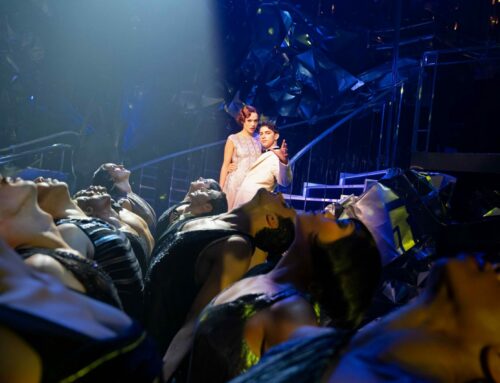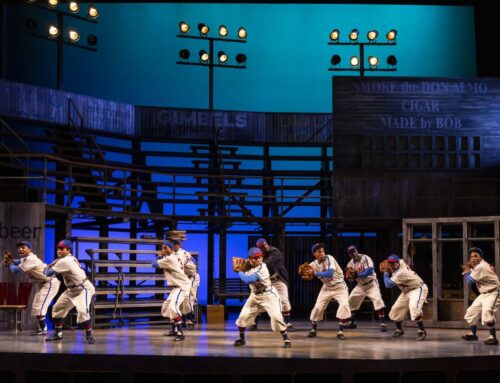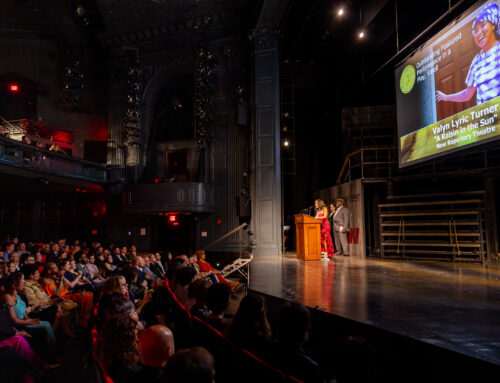If you see only one play in this life–it might have to be WAITING FOR GODOT. Samuel Beckett’s game-changing, landmark tragicomedy that yanks us out of ourselves so we can see the outlines– and perhaps the substance– of our own existence, is a mind blower. And the production by Ireland’s Gare St. Lazare Players and the Dublin Theatre Festival now on the Paramount Center’s Mainstage is one of the most sublimely relatable productions I’ve ever seen.
Two men–tramps? on a round plateau, with a single tree, mirrored by a big full moon, all of it seeming to float in a void– is all there is. And that’s the point. Vladimir “Didi” (Conor Lovett) and Estragon “Gogo” (Gary Lydon) are waiting for someone named Godot. How they pass the time is the substance of the action, and yet “there is nothing to be done.” That bleakly funny conundrum is the source of the play’s power and magic– and has prompted much blather, which I will continue here.
Didi and Gogo realize that they must do something “to give themselves the impression we exist.” So they talk– and we recognize the familiar back and forth tropes of social intercourse: they argue and make up, they banter–complaining and responding, asking and answering questions. The play is structured around these kinds of irresolvable antitheses. Gogo can’t seem to remember anything, as if living in a continuing present, while Didi keeps trying to jog Gogo’s memory to create some kind of continuity and make sense of their experience. Gogo is focused on his ill-fitting shoes and sore feet; Didi is up in his head trying to figure things out and plan their next move. Gogo is physical, Didi intellectual. They might hang themselves– or be saved– if and when Godot comes. Bottom line? They’re going no place, fast.
Didi and Gogo meet another entangled duo passing by– Pozzo (Gavan O’Herlihy) a seemingly cruel master who holds a whip and a rope tethered to his apparent slave, the ironically named “Lucky” (Tadgh Murphy). Lucky eventually erupts in an avalanche of words whose meaning is buried, then falls over. In Act II, their roles are reversed– the master is blind and must rely on the servant. Director Judy Hegarty Lovett along with her facile cast, shape these interchanges meticulously, finding the subtle rhythms and a universe of beats between comedy and tragedy; there’s an ease and clarity of performance that erases the boundaries between them and us.
There is much that remains mysterious here, AS IF we could get far enough away to see things clearly. But we think we know some things for certain: time passes, the tree sprouts three leaves, and a young boy (Connor Thomas Upton) appears once more to tell Didi and Gogo, that Godot is not coming, but will come, “without fail,” tomorrow.
Absurd? Yes; but fundamentally familiar. Who among us has not met the same obstacles over and over again, vowing, like Gogo in the play’s final seconds: “I can’t go on like this.” To which Didi replies “That’s what you think.” Gogo finally declares, ” ‘Let’s go.’ (Spoiler alert!) They do not move. Curtain.”
I didn’t know whether to laugh or to cry–but I’m pretty sure it’s why I go to the theater. Do Not Miss “WAITING FOR GODOT”at The Paramount Mainstage through November 10.






Leave A Comment
You must be logged in to post a comment.